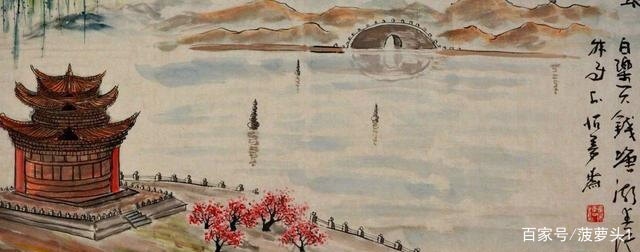A Visit to Qiantang Lake in Spring
- Poetry of Bai Juyi
《钱唐湖春行》By Bai Juyi

Gushan Temple is to the north, Jiating pavilion west,
The water's surface now is calm, the bottom of the clouds low.
In several places, the first orioles are fighting in warm trees,
By every house new swallows peck at spring mud.
Disordered flowers have grown almost enough to confuse the eye,
Bright grass is able now to hide the hooves of horses.
I most love the east of the lake, I cannot come often enough
Within the shade of green poplars on White Sand Embankment.
孤山寺北贾亭西,水面初平云脚低。
几处早莺争暖树,谁家新燕啄春泥。
乱花渐欲迷人眼,浅草才能没马蹄。
最爱湖东行不足,绿杨阴里白沙堤。
- Why Chinese poems is so special?
- The most distinctive features of Chinese poetry are: concision- many poems are only four lines, and few are much longer than eight; ambiguity- number, tense and parts of speech are often undetermined, creating particularly rich interpretative possibilities; and structure- most poems follow quite strict formal patterns which have beauty in themselves as well as highlighting meaningful contrasts.
- How to read a Chinese poem?
- Like an English poem, but more so. Everything is there for a reason, so try to find that reason. Think about all the possible connotations, and be aware of the different possibilities of number and tense. Look for contrasts: within lines, between the lines of each couplet and between successive couplets. Above all, don't worry about what the poet meant- find your meaning.
- A Song of the Spring Palace
- Poems on Army Life IV
- Poems on Army Life V
- West Palace, Autumn
- Hearing the River-Song
- The Lotus Gatherers